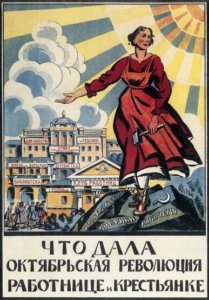
You’re an ethnographer currently working on large-scale women’s organisations which existed in every ex-communist country. Would these have institutions have considered themselves feminist?
It depends on what you mean by the term “feminist”. The Romanian philosopher Mihaela Miroiu said that “Communist feminism is a contradiction in terms.” State-socialist women’s organizations were never trying to back women’s autonomy, to make them independent of their families and children. These organizations were extremely pro-natalist.
Nonetheless, in your research you still point out their impact on women’s emancipation worldwide. How come?
I researched their impact during the UN Decade for Women. The Decade consisted of three conferences: Mexico City in 1975, Copenhagen in 1980, and Nairobi in 1985. In all three, state-socialist women really dominated the discussion and pushed for women’s rights in the international arena. I (together with other historians) argue that without their presence at the UN, there would be no CEDAW (Convention on the Elimination of All Forms of Discrimination against Women) and no International Women’s Year. These socialist women were a united block, with a vision for the public provision of services for women, like maternity leave, kindergartens, crèches, public laundries, canteens etc. Even feminists in the West got a big boost from that.

What was the impact of these women’s organisations in their own countries?
In most socialist countries the women’s organisations were able to act more autonomously from the Communist Party than is usually acknowledged. Whether or not these organisations were truly independent, we don’t know. Obviously many of the women were deeply ideologically committed communists. However, they did a lot for women. I see these women as activists. Nonetheless their success depended on working with men and in the established orders of power.
Feminism and the refusal of work: an interview with Kathi Weeks
How could they implement their agenda in such a hierarchically planned system as state-socialism?
They were very savvy in using anti-capitalist rhetoric to promote women’s issues, and they strategically used Marxist-Leninist language to reach their goals. They enforced family-friendly measures by selling them as a unique feature of socialism. Bulgarian women’s organizations, for example, argued that under a capitalist economy, individual firms cannot be expected to pay for maternity leave because it will make women uncompetitive in the labour market. Firms just won’t hire women, and this will hurt rather than help women. Ergo: only socialism can guarantee this to women because the state is the employer.
What other concrete measures did they achieve?
The socialist state reduced the burdens associated with women’s reproductive biology, which allowed many women to thrive.
In most countries, the organisations created a social welfare state that worked for women. Maternity rights and child benefits in post-socialist states are legacies of the communist era. The Bulgarian family code from 1985 is still in place today. Another legacy is the high number of women in the professions of law, banking, and medicine. I would argue that the state-socialist women’s groups pressed hard to get women high quality training and higher positions in white-collar industries. Of course, women also experienced a wage gap and had to deal with the double burden of paid and care work, just like any working woman with children. But the socialist state reduced the burdens associated with women’s reproductive biology, which allowed many women to thrive.
How did women react to this state-organised emancipation?
There are regional differences. In more agricultural economies like Bulgaria, women were already used to working full-time. The communist emancipation project for them meant living in nicer houses in the cities. In countries that were already more industrialized and more “bourgeois” before WWII, like Hungary, women might have experienced the project as “forced emancipation”, as the population was also a little more conservative regarding gender roles. Some women who were used to staying at home, especially those of the upper classes, probably didn’t like being forced to work. But sociological surveys done under socialism show that most women would not have chosen to stay at home, even if their husband’s wage was enough to support the family. They liked having their own money and a profession.
Emancipatory movements must have a populist dimension. An interview with Nancy Fraser
Can we speak of a “common feminism” in the region that developed under a shared socialist past?
Competitive labour markets will always devalue women’s care work.
Yes, definitely – and men are the reason! Under socialism, you were chastised if you had bourgeois relations with your wife, if she was “only” a housewife. Men were forced to accept that women go to work. Men in the West never accepted that, in my opinion. The “pioneri” were not a sex-segregated group, like girl and boy scouts in the United States. Boys and girls were trained to understand from a young age that they are educated in the same way. Women’s emancipation was sold as progress. The message was: men and women may be biologically different, but women have the same rights as men and make equally valuable contributions to society – and that’s what makes socialism better than capitalism. Competitive labour markets will always devalue women’s care work.

So why do state-socialist women’s organizations have a bad reputation in the region today?
In the region, women’s emancipation under state-socialism has a problem because it is still associated with the negative aspects of the socialist era. On the other hand, we, Western feminists, generally think of the women in these organisations as dupes of the men in the Communist party. But imagine what their legacy would be if these women activists had been branded as the “closeted dissidents” who fought for women’s rights against the established male authority in the Communist Party. We know that this opposition within the party existed: in Bulgaria, Sonia Bakish, who worked for the women’s organization and edited the women’s magazine Zhenata Dnes (Жената Днес) for many years, was in fact an Ekoglasnost dissident and got kicked out of the Communist Party.
Are women’s movements in Eastern European countries affected by this legacy today?
I am impressed how younger women in Eastern Europe are rediscovering the socialist heritage of women’s movements. I see a lot of energy there. It’s not an easy position to be in, because not only is women’s emancipation seen as something from socialist times, it is also confronted with the accusation of being a Western import. This “Western import”, liberal feminism, is now experiencing a heavy backlash from right-wing populist movements.
What can feminists in Eastern Europe do against this backlash?
Given the precarity of women’s rights in Eastern Europe right now, it’s important to not just reject all kinds of criticism towards feminism as a right-wing plot. We have to ask ourselves: why is this happening now? It is very easy to look at what’s happening in Hungary and Poland, at the resurgence of patriarchal, right-wing powers, and to look at men as simple patriarchal jerks, who are hoping for the 1950s to come back with their women in the kitchen – barefoot and pregnant. We have to think about how we can work together with people who are suffering economically and see right-wing populism as their only escape. People on the right are organised. To fight them we also have to appeal to emotion, while remembering that women are just as important a part of right-wing conservative movements as men.
![Political Critique [DISCONTINUED]](http://politicalcritique.org/wp-content/uploads/2015/09/Political-Critique-LOGO.png)
![Political Critique [DISCONTINUED]](http://politicalcritique.org/wp-content/uploads/2015/09/Political-Critique-LOGO-2.png)